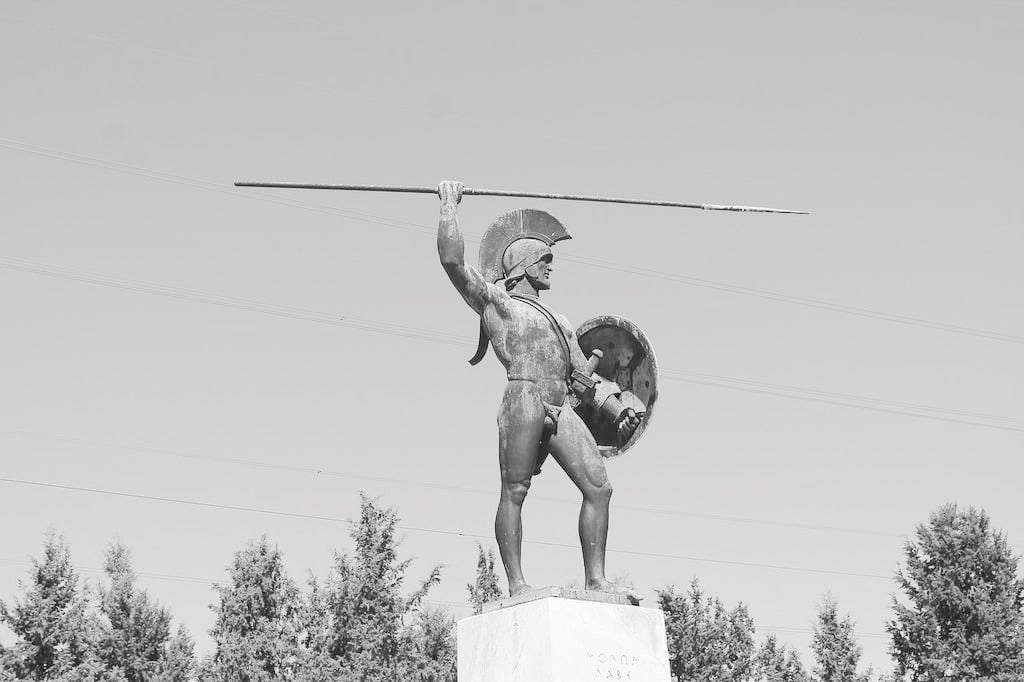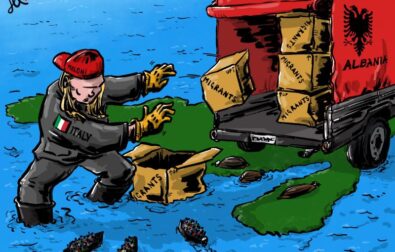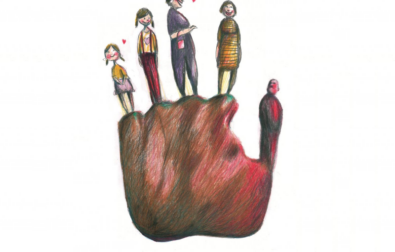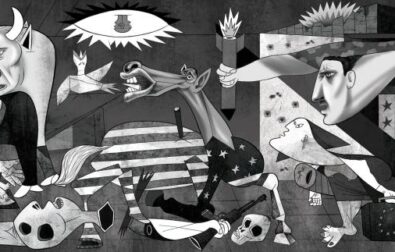“UNTHINKABLE! ILLEGAL IMMIGRANTS WANT LEONIDAS OUT OF THERMOPYLAE!!! SEE WHY!” Under this headline, VoiceNews.gr, a “Greek news website offering real news and information”, recently reported that asylum seekers residing at the Temporary Accommodation Facility in Thermopylae were requesting that the statue of Greek hero Leonidas be removed on the grounds that its nudity offended their women.
The article was accompanied by a short video, uploaded to the website's YouTube channel, as evidence.
In the days that followed, the article was relayed on a number of news websites and social-media accounts, often accompanied by virulently xenophobic rhetoric in which asylum seekers were portrayed as a threat to Greece's history and cultural identity.
Solomon has tried to answer several questions related to the controversy: whether there really was a protest against the statue; which media outlets relayed the story; and how these outlets are connected to each other. We also looked back at comparable past incidents. It turns out that this is not the first time that unfounded news stories about immigrants have been spread in this way.
What the article says
The original article appears to have been posted on the VoiceNews.gr website on 28 September 2025, at noon.
“According to reliable information from VoiceNews”, reads the article, “in historic Thermopylae, a stone's throw from the iconic statue of Leonidas, there is a facility for hosting illegal immigrants. The latter, in an unprecedented and outrageous move, are demanding the removal of the statue of the hero who symbolizes the bravery and resistance of the Greeks in the legendary battle of Thermopylae. The reason? The statue, they say, is 'naked' and offends their women!”
The article does not refer to or describe any actual event, nor does it specify the source of the report it is relaying. The anonymous author limits themself to a mentions of “uncontrolled illegal immigration plaguing Greece” and “irresponsible open-border policies” that are creating a challenge to Greek national identity.
The text concludes: “Greece must protect its identity. The authorities must immediately reject such requests and take measures to restore order. Leonidas is not leaving Thermopylae! It is time to say 'Molon Labe' [literally “come and take it”, an expression of defiance attributed to Leonidas] to those who undermine our history and dignity!”
A video attached to the article, bearing a watermark with the VoiceNews.gr logo, was also posted on 28 September 2025.
The video starts by showing the inside of the refugee hostel, which has been operating since February 2016 in the premises of a former hotel that closed in the late 2000s. The sequence, shot from inside a car, shows blankets and clothes hanging from the hotel’s balconies, plus some containers in the forecourt. The video then cuts to a shot of the Thermopylae monument. A protective fence appears to have been erected for construction work. In front of the monument a few people can be seen – perhaps tourists.
The images in the video do not show any evidence of a protest. That alone makes the title misleading.
Thermopylae’s mayor denies the allegations
Solomon contacted the leader of the community council of Thermopylae, Dimitris Floros, asking if he was aware of any opposition to the statue from asylum seekers at the hostel.
“Personally, I have not heard anything like this being discussed in the community, nor have we received any complaints about this issue”, he told Solomon. He added that, as leader of the community council, “I have responsibility for any issues that arise in the area. So if there was anything like that, I would know about it.”
Solomon also contacted the hostel’s manager by email. We asked whether this news had been circulating in the town, even as a rumour. We inquired, more generally, how the hostel's residents were co-existing with the local community.
At the time of publication, we had not received a response.
Floros' refutation is particularly significant given that last summer he expressed serious reservations about the hostel's impact on his community and on tourism in the area. In a radio interview he even questioned its legality.
Considering his effective position as mayor and the responses of residents, it seems unlikely that an event such as the one reported by VoiceNews.gr would be kept quiet if it had actually happened.
Commenting on the video, the council leader indicated that he was aware of it: “The fence shown in the video around the memorial is for some redevelopment work that has been going on in the wider area for about 7-8 months, with funding from the Ministry of Culture. Nothing else is happening there.”
At the centre of the story: Greek Solution
Almost immediately following the story’s publication, the websites of the radio station Focus FM in Thessaloniki and Machi FM in Athens took up the baton. The following day, Meaculpa.gr followed suit.
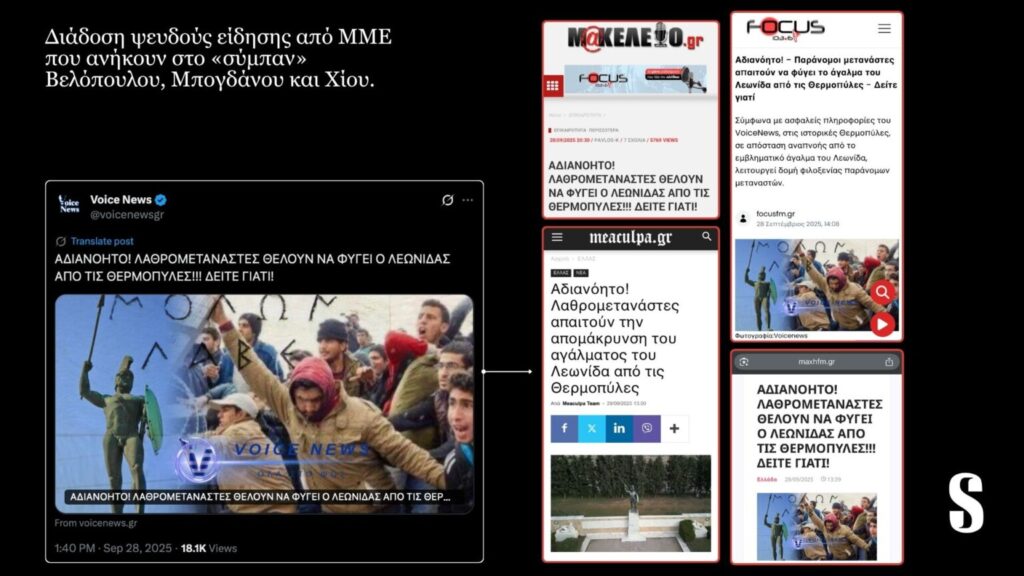
Last May, Solomon revealed how these media outlets – including the news site VoiceNews.gr, which first spread the false news – are part of a broader network associated with the leader of the right-wing populist party Greek Solution, Kyriakos Velopoulos.
Solomon's reporting revealed several notable facts:
- The owner of VoiceNews.gr, Theodoros Papoulidis, was a candidate for the European Parliament with the Greek Solution party in 2024
- Since January 2025, the sole shareholder and director of Focus FM has been Grigoris Seretis, son of Dimitra Kritikou, vice-president of the Greek Solution party
- For about a year now, Machi 99.8 FM has been owned by Nikoleta Sereti, daughter of Kritikou and Greek Solution candidate for Achaea in the 2019 national elections
- The station is managed by 85-year-old Domna Papoulidou, who is also the mother of Theodoros Papoulidis
An Athens-based TV channel, Alert TV, regularly broadcasts programmes featuring Kyriakos Velopoulos, who was a TV personality before becoming leader of Greek Solution. The shows are then syndicated out to regional television stations, earning Alert TV a reputation as “Velopoulos's flagship”.
At the heart of Alert TV's schedule is the “Anatreptiko” news bulletin, which often relays content from VoiceNews.gr. Anatreptiko is also a platform for Grigoris Seretis and Nikos Petrouakis, journalists at Focus FM. The latter was a candidate for the European Parliament with Greek Solution in 2024. Konstantinos Bogdanos [a renegade right-wing politician] and Stefanos Chios [a firebrand journalist with multiple libel convictions, and editor of the newspaper Makeleio] have also appeared on the station's programmes in the past.
The latter two names are also linked to the Thermopylae Memorial episode, since that story was relayed both on [Chios's] makeleio.gr (on September 28) and on Meaculpa.gr (on September 29). This last site was founded in 2017 by Konstantinos Bogdanos and transferred to his wife in 2019 after he was elected as a member of parliament for the New Democracy party.
Bogdanos hosts a show on Machi 99.8 FM and is a regular guest on Alert TV's Anatreptiko news show, while Meaculpa.gr tends to platform Velopoulos's views. We also found an item about Thermopylae on the Thrace-centred news site Thraction.gr, by journalist and analyst Nikos Arvanitis.
On social media, we were able to identify the following posts, which contained angry reactions from users:
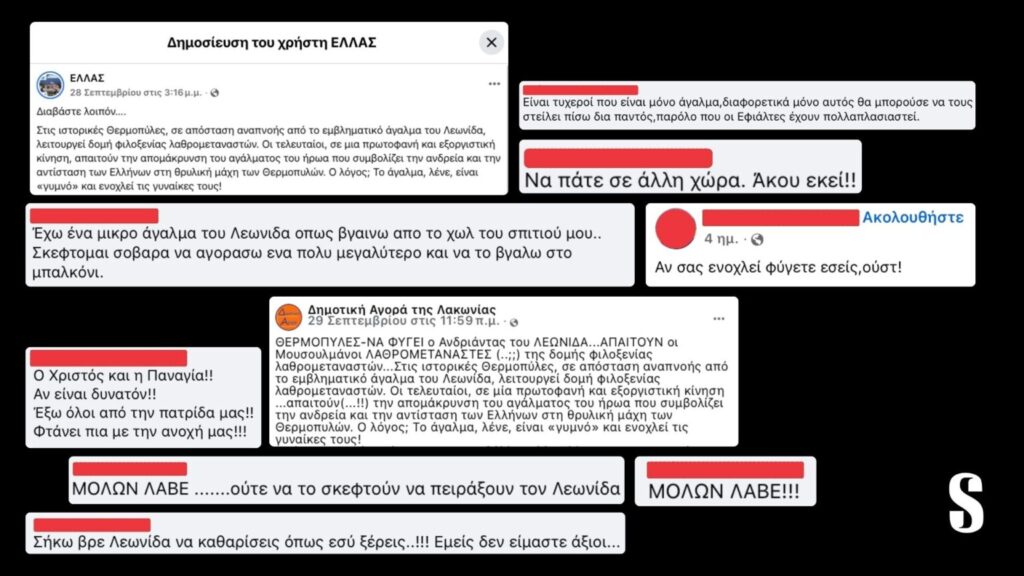
Xenophobic fake news from Eleftheroupoli to Mexico
False news stories targeting refugees and immigrants are not a new phenomenon.
In March 2016, the Neapolis newspaper in Kavala (northern Greece) claimed that “fanatical Muslim refugees” in the town of Eleftheroupoli had torn down an icon of the Virgin Mary in the gym where they were staying. They had also supposedly demanded that the bells of the Agios Nikolaos church not be rung, and trampled on the offerings given to them by the church during Lent.
The story was reproduced by news websites and blogs (for example, here, here and here).
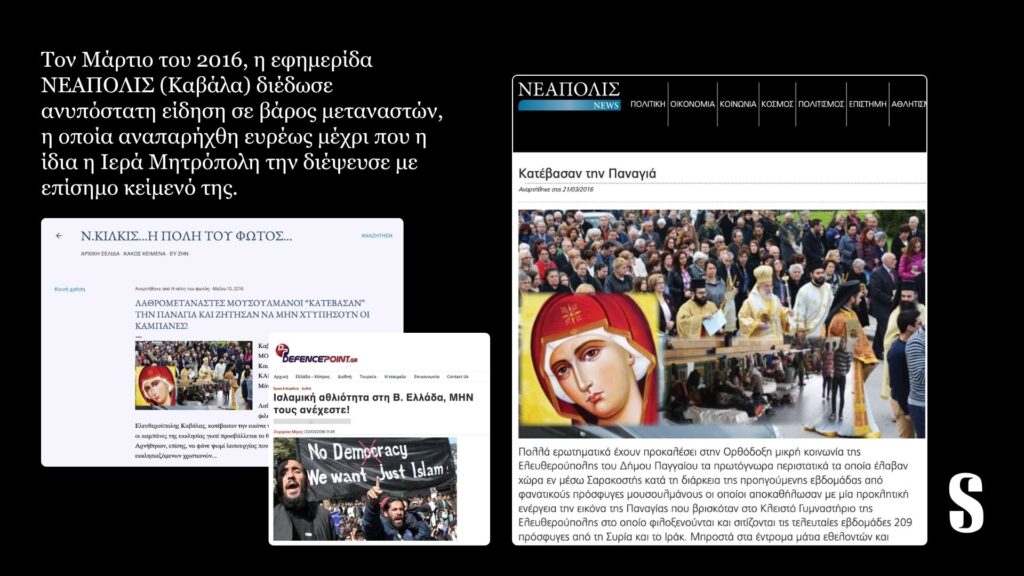
Ultimately, the denial came from the Holy Diocese of Eleftheroupoli itself, which “categorically [declared] the news in question to be completely inaccurate”, adding that “the respect of the refugees towards the priests who minister to them is self-evident”. The diocese asked that its comments be published in the Neapolis newspaper, which had spread the invented story.
Another case comes from October 2018 and the Facebook account of Press News. A video was posted showing a young man setting fire to Christian icons, with the caption: “Will these people who carry so much hatred be integrated into our society?” The administrators posted a comment under the post: “These icons are not in Greece… The question is, will these people who hate Christianity so much be integrated into a country like Greece?”
In fact, the video appears to depict Mexican Catholics, some of whom consider religious images to be symbols of idolatry and burn them to exorcise evil.
Many users were quick to point out the obvious fact that the people in the video are speaking Spanish. But the “news” was believed by dozens of others, and accompanied by xenophobic and racist comments about immigrants in Greece. It was a similar situation to the story about Thermopylae.
“It would be impossible for it to go unnoticed”
In the view of Lefteris Papagiannakis, director of the Greek Council for Refugees, false reports about refugees are not only aimed at the refugees themselves, but also serve as a tool for stirring up passions and creating discord in society.
A refugee crisis, he points out, is “a complex issue” and is therefore ripe for exploitation “when someone wants to cause trouble". He recalls the case of Eidomeni [site of a dysfunctional refugee camp near the Turkish border], where inaccurate information about an open border led to a needless movement of people hoping to cross into Western Europe.
Fake news is not just being spread at the national level, but also locally, says Papagiannakis. Often, it does not reach the Athens media bubble. “There is [fake] news that we don't hear about, either because it is quickly refuted by local authorities or because it doesn't 'stick'. It is so extreme that people are not convinced.”
On the alleged incident with the statue of Leonidas, Lefteris Papagiannakis says that the story was bound to attract attention. “The statue is in a very central location. It is impossible for any reaction to its existence to go unnoticed. It's like the statue of Harry Truman in Athens, which protesters try to tear down from time to time. It's in such a central location that it immediately makes the news.”
False stories tend to touch on deeply held symbols and sensitivities. “Fake news often targets the religious and historical symbols at the core of Greek identity. One of these is Leonidas.”
👉 Original article on Solomon
🤝 This article was created with the support of the European Media and Information Fund (EMIF). It does not necessarily reflect the views of EMIF and its partners, the Calouste Gulbenkian Foundation and the European University Institute.
Do you like our work?
Help multilingual European journalism to thrive, without ads or paywalls. Your one-off or regular support will keep our newsroom independent. Thank you!













